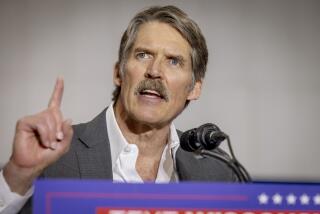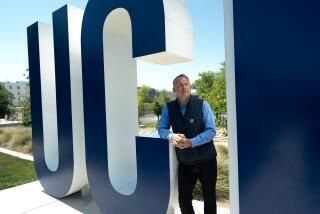The President’s Cancer
Cancer. Few words are shrouded with such fear and dread. Cancer is indiscriminate. It strikes the young and the old, the fit and the weak, the rich and the poor, the common man and presidents.
Cancer. It shocks us so, although the American Cancer Society says that one American in three will suffer cancer during his lifetime. Rare is the person who has not stared this apocalyptic figure in the eye through the illness or death of a relative or loved one. Cancer comes in myriad forms from many causes. It can attack any part of the human body at virtually any time.
The shock is particularly acute when cancer strikes someone who is as physically vigorous as President Reagan. We tend to impose on presidents a certain bigger-than-life aura in any event. But here is a man who survived a traumatic bullet wound, who emerged to chop wood and twist congressional arms again, who seemed almost superhuman to some. Here is a man, however, who can be as vulnerable as any to the unseen cells that can literally eat life away from the inside.
The President’s physicians are confident that they have excised all the cancer from the President’s colon, that it has not spread and that the chances are better than 50-50 that it will not recur. The grim realty of cancer, however, is that certainty of cure can be elusive. What is guaranteed is that the President will receive the best of care and regular examinations to guard against any further onslaught.
There are other Americans who will not--some of them out of the irrational belief that it will always hit the other person, not them. Cancer of the colon is called the silent killer because of the frequent absence of physical symptoms such as pain until the disease is in an advanced stage.
The American Cancer Society says that 138,000 new cases of cancer of the colon will be reported this year, and that there will be 60,000 deaths. The cure rate is about 50%. It could be 80% with earlier detection, which is possible with regular examinations.
The President’s physician says that there is no reason the President should not resume full normal activities after an appropriate recovery. That is welcome news. This incident will challenge again the President’s inherent optimism toward life in a world of mysterious hazards. No one should be surprised if Ronald Reagan meets this test as he has others--with a grin and a quip and a call to get back to work.
In the process, the President may serve as the vehicle for helping to dispel some of the mystery and fear that cloaks the dreaded word.
More to Read
Get the L.A. Times Politics newsletter
Deeply reported insights into legislation, politics and policy from Sacramento, Washington and beyond. In your inbox three times per week.
You may occasionally receive promotional content from the Los Angeles Times.






